HILO—Gusty winds and heavy rain failed to dampen the spirits of several hundred Hawaii Division members and retirees who packed the ILWU Hall in Hilo for a night of fellowship, tasty food, and hot music on February 15, 2003. They gathered
for the 26th Annual Recognition Night to celebrate and a select group of ILWU units for their outstanding contributions to their membership and to the trade union movement.
The Hawaii Division of the ILWU has 5,000 members who work in 39 units on the Big Island. The unit is the basic ILWU organization at each work site or company which has a collective bargaining agreement with the union. Altogether, there are 198 units in the state of Hawaii which comprise ILWU Local 142.
Each unit has its own officers, who are responsible for carrying out union programs among the members of their unit, with help always available from the full-time business agents of their Division. Their activities range from assisting members with problems on the job, making sure members get the full benefit of the union contract, running and attending meetings, and
helping with Division programs such as political action and organizing. This work can demand a lot of time and commitment from these unit officers, all of whom serve as unpaid volunteers.

Dennis Andres and Rey Gascon from Unit 1401 - MLP Ka‘u receive the award for Best Large unit on behalf of their members from President “Bo” Lapenia.

Hawaii Division editors for 2002 (l-r): Teena Butterfield (who was an editor on Maui and will begin editing a bulletin for West Hawaii supermarket units), Jeannie Martin - Mauna Lani Bay Hotel & Bungalows, Swanee Rillanos - Mauna Kea Beach Hotel, Anthony Kubera - MLP Keaau, Jamie Spencer - Orchid at Mauna Lani, Jeanne Yoshizawa - Mauna Loa Mac Nut Corp., Dara Vierra - Sack ’N Save Hilo and Puainako, Hawaii Division Education Coordinator Richard Baker Jr., Margaret Aguiar and Anna Ater, also from Sack ’N Save. Not pictured: Corinna Salmo - MLP Ka‘u.
There are other rewards besides pay. There is the invaluable education and training they receive; there is the satisfaction of helping to bring justice and dignity on the job; and there is the chance to be named an outstanding unit on Recognition Night.
Thank You
Recognition Night is one way that Hawaii Division has found to show appreciation for a job well-done and to identify units that serve as a model for other units to follow.
Hawaii Division Director Fred Galdones explained the criteria used in choosing the outstanding units— service to members, handling grievances on their own, holding regular membership meetings, attending the monthly Division Executive Board meetings, and getting involved in union political action.
Five units were chosen this year. Two units were named as outstanding in the small unit category of 1-29 members—Unit 1426 - Hamakua Medical Center and Unit 1513 - Makalei Golf Course. Unit 1201 -
Hawaii Division recognition night President’s remarks
We need to take our country back in 2004
We are gathered here tonight to honor and give recognition to those units and individuals who have done an outstanding job in carrying on and supporting the work of this union. They worked hard and deserve the credit.
On behalf of the local officers and the entire membership of this union, thank you for all you have done and continue to do for this organization.
I also want to thank all the rest of you here, the Division full-time officers, our pensioners, our active members, and
your families. I know all of you worked very hard this last year, especially around the elections in support of our Unions political action program.
We had some disagreements over which candidate to endorse in this last set of elections, but the main thing is
we don’t allow these differences to divide us or divide this union. Politicians come and go, but this union is here to stay. In the long run, we need to always think about what is best for this organization and what is best for our membership.
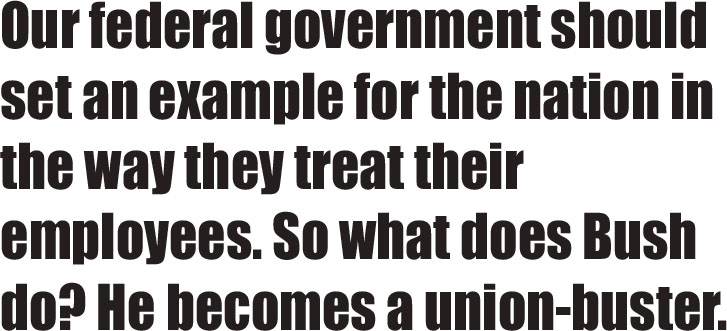
Throughout our long history, the ILWU has been able to maintain its unity and strength, because of our commitment to rank-and-file democracy. We have learned that democracy works best when there is free and
open debate over the issues and when people are not afraid to voice their opinions. We have learned to have faith in and support the decisions that come out of this democratic process, because this is the best way to build unity, and with unity, comes strength.
Why politics?
Some of our members still don’t understand why unions must be involved in politics. Some of our members think it’s too political when we talk about the differences between Democrats and Republicans. And a lot of our members apparently think politics isn’t important and doesn’t matter to them, because they don’t bother to vote or aren’t even registered to vote.
Politics does matter, and George Bush has given us a lot of examples of how working people can get shafted by a Republican President who blatantly puts business and the wealthy first.
In longshore negotiations on the West Coast, we had to take on the employers and President Bush, who
intervened by ordering the opening of the docks under a Taft-Hartley injunction. Earlier, the Bush Administration
warned ILWU President Jim Spinosa that a longshore strike would be viewed as a threat to national security. Bush had already shown a readiness to take away the right to strike. He intervened in negotiations between machinists at Northwest and United Airlines and between flight attendants and American Airlines.
Union-Busting
Our federal government should set an example for the nation in the way they treat their employees. So what does Bush do? He becomes a union-buster.
Just last month, 64,000 airport screeners were denied the right to unionize and bargain collectively.
Why? Because, says the newly created federal Transportation Security Administration, “Fighting terrorism demands a flexible workforce that can rapidly respond to threats” and this “can mean changes in work assignments and other conditions of employment that are not compatible with the duty to bargain with labor unions.”
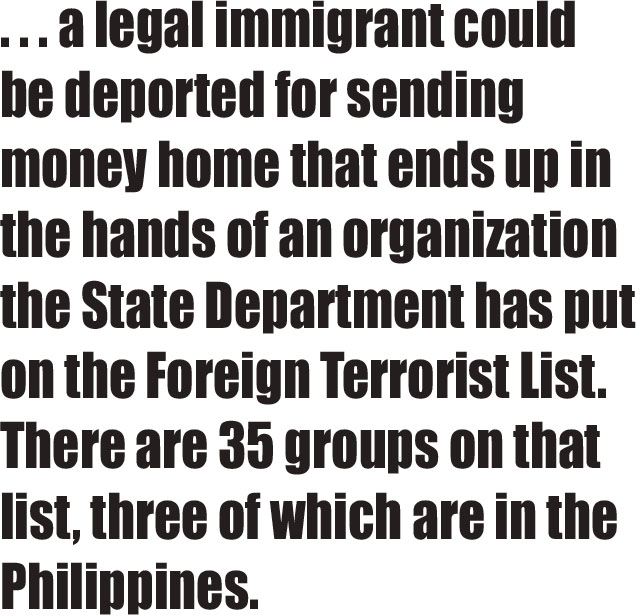
Last January 2002, claiming it was a matter of national security, Bush issued an executive order that wiped out union representation for 300 secretaries, file clerks, and messengers working for the U.S. Justice Department. He signed the order and the union was out. The union representing these workers, the American Federation of Government Employees, was simply told their bargaining units no longer exist. Another 170,000 federal workers may also lose their right to union representation when they are transferred into the new Department of Homeland
Security.
By his example, Bush is telling employers that its okay to bust the union. So in Hawaii, more employers are
encouraged to fight or break the union—at Hawaii Motors, at Hale Anuenue, at Ohana Keauhou Beach Hotel, at HT&T, or at the King HT&T Longshore was named the outstanding medium sized unit with 30-99 members. Two large units with over 100 members received the outstanding award—Unit 1515 - Orchid at Mauna Lani and Unit 1401 - MLP Ka‘u.
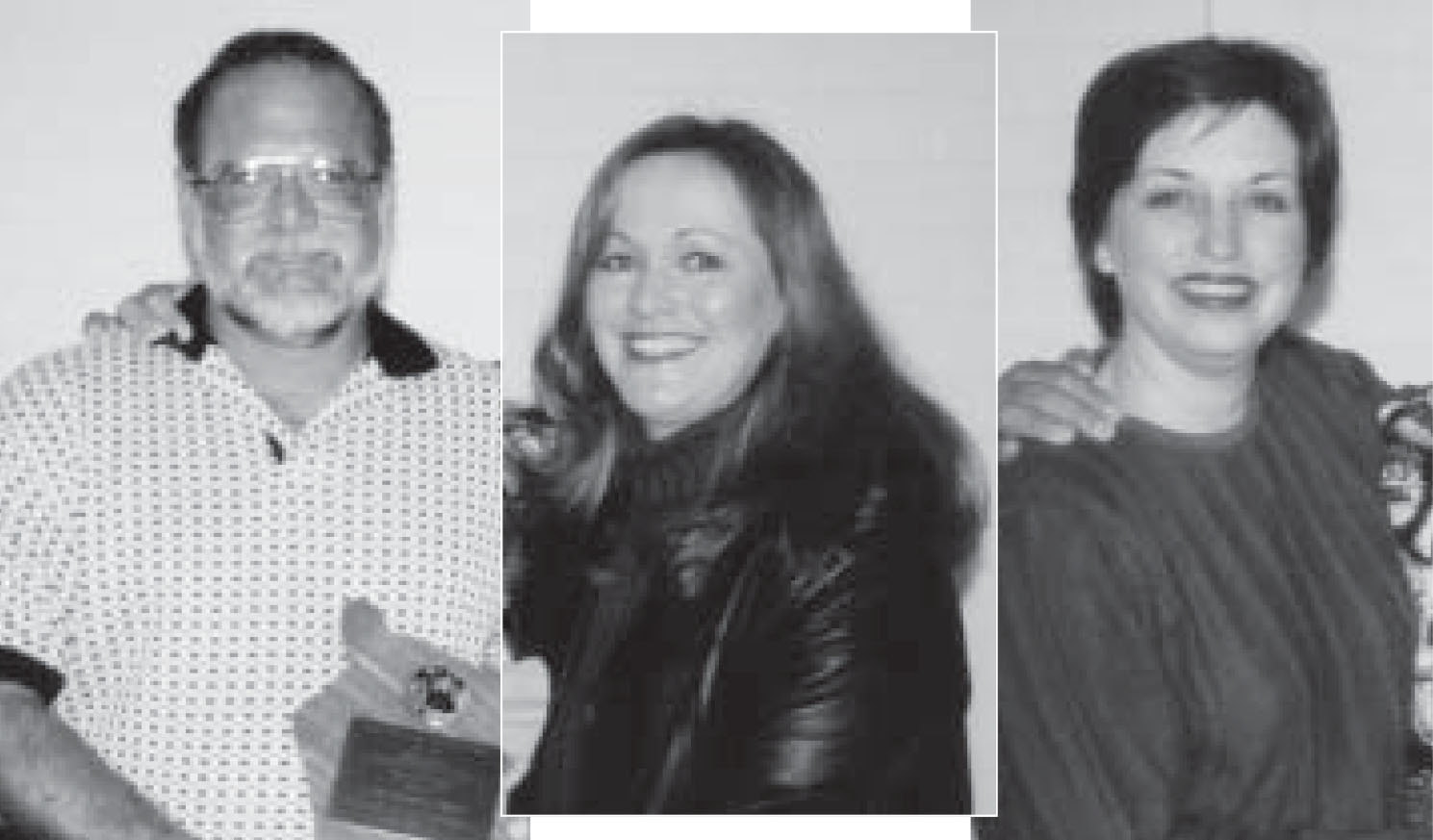
(L-r) Damien “Skip” DeMello (Unit 1513-Makalei Golf Course) and Jo Ann Lau Kong and Roxanne Paiva-Rosborough (Unit 1426 Hamakua Medical Center) receive the Best Small Unit awards for their units.
Keeping members informed Hawaii Division’s hard working crew of 15 unit bulletin editors also received awards. These volunteers produce a monthly union newsletter which goes to the members of their unit. The newsletter helps to educate
and inform members about union activities.
Tony Kubera, the editor for Unit 1403 - MLP Keaau, received first prize for the best Division bulletin. Jeanne Yoshizawa, the editor for Unit 1402 - Mauna Loa Macadamia Nut Corporation, received the second prize.
Richard Baker Jr., the business agent in charge of advising the editors, explained how the bulletin program is one of the many ways the union develops leadership among its members. Richard explained how he and Fred Galdones were former bulletin editors.
Pension Club Awards
ILWU Pensioners Council president Tom Poy presented the last awards of the night’s program to two outstanding pension clubs. The awards, which includes a cash prize donated by the ILWU Memorial Association, were given to the Honokaa Pensioners Club for the most activities and the Pahala Pensioners Club for recruiting the most new members (14 new members).
Guest Speakers
Hawaii Island Mayor Harry Kim and Local 142 President Eusebio “Bo” Lapenia Jr. were the keynote speakers for the event. Mayor Kim explained how he sees the union as a positive force for social justice, a view shaped by his experience growing up on Olaa plantation, where his father worked. Kim warned that, “there are forces out there who want the union out, who don’t want the union in this society. I don’t think this is good, for you, for government, for workers, for business, for the County.” Kim also expressed his personal opposition to war, which he called “lunacy.”
In his remarks, President Lapenia went further and named the anti- union forces hinted at by Harry Kim. “Politics does matter, and George Bush has given us a lot of examples of how working people can get shafted by a Republican President who blatantly puts business and the wealthy first,” Lapenia said.
Lapenia gave examples of how the Bush Administration denied the right to unionize to 64,000 airport screeners in the newly created federal Transportation Security Administration, how Bush interfered in longshore negotiations with a Taft-Hartley injunction, and how Bush wiped out the union in the U.S. Justice Department. (See below for the full text of Lapenia’s remarks.)
“By his example, Bush is telling employers that its okay to bust the union,” Lapenia said. “So in Hawaii, more employers are encouraged to fight or break the union—at Hawaii Motors, at Hale Anuenue, at Ohana Keauhou Beach Hotel, at HT&T, or
at the King Kamehameha Hotel.”
President Lapenia concluded by urging members to get more active in politics by preparing for the 2004 elections. “The labor movement has a vision of a world that is very different from the vision being promoted by the people running this country
today. This is why our union has to be active in politics. This is why we need to be educating our members and their families and reaching out to the community. This is why we need to be preparing for the 2004 elections. We need to take our country back in 2004.” Kamehameha Hotel.
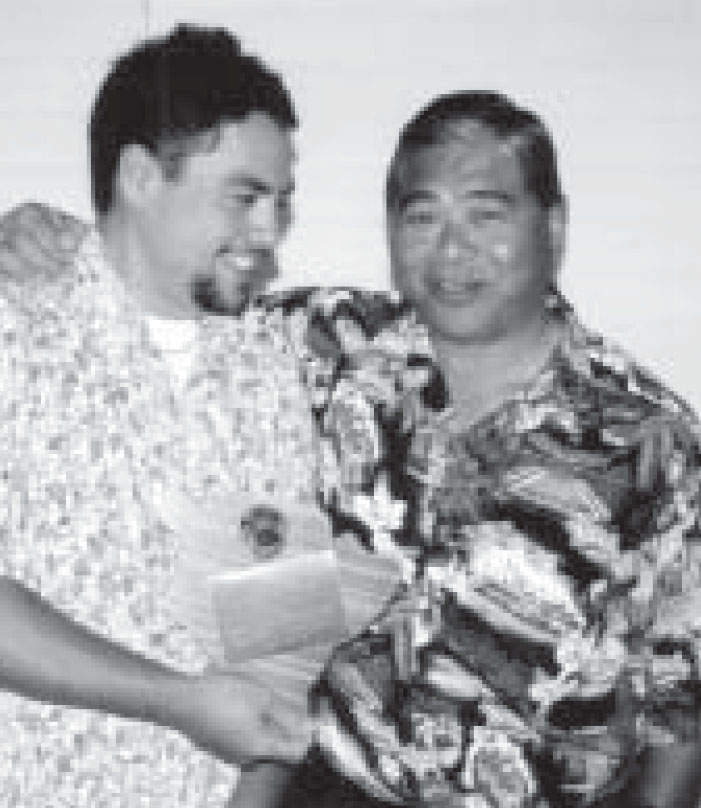
Arthur Reeves, representing Unit 1515-Orchid at Mauna Lani accepts the Award for Best Large Unit (tie with MLP Ka‘u).
Our freedom and civil rights are being seriously undermined in the name of national security. The so-called “Patriot Act”, which Bush pushed through Congress in October 2001, is turning our country into a police state. The law goes overboard in giving the FBI and CIA the power to spy on us, secretly search our homes or workplace, arrest and detain citizens, and deport legal immigrants. For example, a legal immigrant could be deported for sending money home that ends up in the hands of an organization the State Department has put on the Foreign Terrorist List. There are 35 groups on that list, three of which are in the Philippines. The Patriot Act even requires back-
ground security checks for CDL drivers who carry hazardous materials.
The Patriot Act is so bad that a number of cities have passed resolutions calling for its repeal. Our Hawaii State Legislature is also considering two resolutions to repeal the unconstitutional provisions of this act.
Tax Giveaways
Bush is plundering our nations treasury with tax giveaways to the rich. Over half—52 percent—of the Bush
Tax Cut of June 2001 goes to the wealthiest one percent—people who earn an average of $1.5 million a year. They get back an average $85,000 a year from this tax cut—a total of $884 million. Most of us working people will
get a tax cut worth only $800 - $1000.
To sell his first tax cut, Bush gave Congress misleading figures that estimated a federal surplus of $5.6 trillion and the cost of the tax cut at only $1.3 trillion. The real surplus was closer to $1.6 trillion and the tax cut could cost as much as $2 trillion. This is one reason why the federal budget is now showing a $300 billion deficit this year. This deficit takes money away from other programs such as education, threatens Social Security and Medicare, and is
forcing the government to make other cuts, such as the pay and benefits of federal workers.
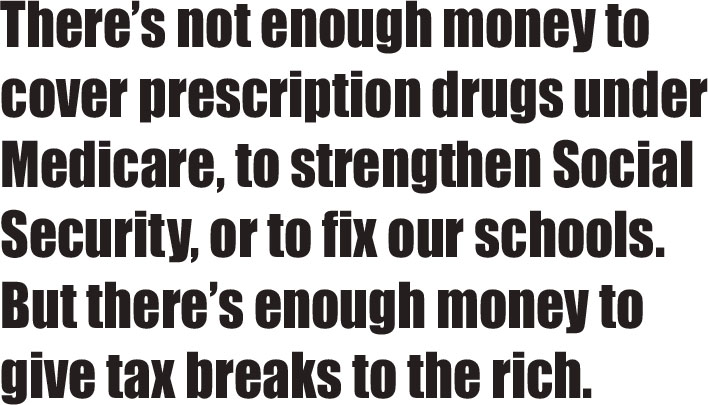
In November 2002, President Bush ordered a cut in the 2003 pay increase for rank-and-file federal workers and
the elimination of a locality pay allowance. He said the added cost would threaten the fight against terrorism and
the federal government needed to stay within budget. Yet one week later, Bush approved paying cash bonuses to top management, many of them political appointees, as a reward for their good work.
Now, Bush is calling for even more tax cuts for the wealthy by eliminating the tax on corporate dividends. There’s not enough money to pay federal workers a decent wage. There’s not enough money to allow federal workers the right to unionized. There’s not enough money to cover prescription drugs under Medicare, to strengthen Social Security, or to fix our schools. But there’s enough money to give tax breaks to the rich.
These are just a few examples of what Bush is doing. His record on the environment, on dealings with companies like Enron, on safety and health, on immigration, on equal rights is just as bad. What’s amazing is how this is all being ignored, because we are being distracted by push for war against Iraq.
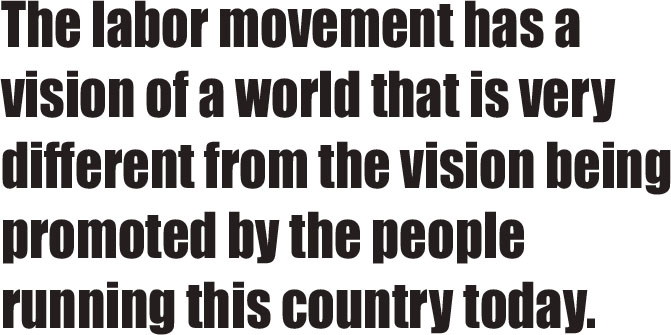
Bush appears hell bent on dragging us into a war that will only benefit military contractors and oil companies. A war would only make things worse in the Middle East and would threaten Hawaii’s tourism industry. The rational
solution is to continue the weapons inspections and deal with countries like Iraq and North Korea by working
through the United Nations. Our State House of Representatives just passed a resolution supporting such a policy.
More than wages and benefits
In these grim times, we are reminded that unionism has always been much, much more than handling grievances and bargaining with individual employers over wages and working conditions.
The union movement has to be concerned about what’s happening to this country and what’s happening in this world.
The Preamble of our own ILWU Constitution states our objective is: “to advance the living standards of our fellow workers everywhere in the world, to promote the general welfare of our nation and our communities, to banish racial and religious prejudice and discrimination, to strengthen democracy everywhere and achieve permanent peace in the world.”
The labor movement has a vision of a world that is very different from the vision being promoted by the people running this country today.
This is why our union has to be active in politics. This is why we need to be educating our members and their
families and reaching out to the community. This is why we need to be preparing for the 2004 elections.
We need to take our country back in 2004.
